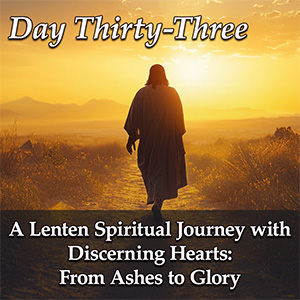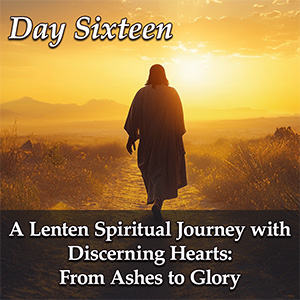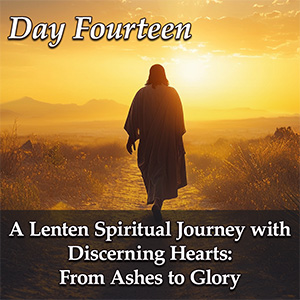Podcast: Play in new window | Download (Duration: 8:44 — 6.1MB) | Embed
Subscribe: Apple Podcasts | Spotify | Amazon Music | Android | Pandora | iHeartRadio | JioSaavn | Podchaser | Gaana | Podcast Index | Email | TuneIn | Deezer | Anghami | RSS | More

A Lenten Spiritual Journey with Discerning Hearts: From Ashes to Glory – Discerning Hearts Podcast
Day 23: “The Battle Within”
Scripture Reading (Jerusalem Bible):
Luke 11:14–23
Jesus was casting out a devil and it was dumb; but when the devil had gone out the dumb man spoke, and the people were amazed. But some of them said, ‘It is through Beelzebul, the prince of devils, that he casts out devils.’ Others asked him, as a test, for a sign from heaven; but, knowing what they were thinking, he said to them, ‘Every kingdom divided against itself is heading for ruin, and a household divided against itself collapses. So too with Satan: if he is divided against himself, how can his kingdom stand? – since you assert that it is through Beelzebul that I cast out devils. Now if it is through Beelzebul that I cast out devils, through whom do your own experts cast them out? Let them be your judges then. But if it is through the finger of God that I cast out devils, then know that the kingdom of God has overtaken you. So long as a strong man fully armed guards his own palace, his goods are undisturbed; but when someone stronger than he is attacks and defeats him, the stronger man takes away all the weapons he relied on and shares out his spoil.
‘He who is not with me is against me; and he who does not gather with me scatters.’
Reflection:
By this point in our Lenten journey, we may have begun to taste the fruits of prayer, self-awareness, and even forgiveness. But with every step toward healing and holiness, we also encounter resistance. The enemy does not want us to grow in love. The more we open ourselves to grace, the more temptation may rise—whispers of accusation, discouragement, or the old lies that once held us captive.
Today’s Gospel makes this dynamic visible. Jesus casts out a demon and restores speech to the mute man—but some in the crowd twist this act of mercy, accusing Him of using the devil’s power. Jesus responds by exposing the contradiction: evil cannot cast out evil. And He offers a deeper truth—that it is by the “finger of God” that He heals and frees.
The real battle, Jesus teaches, is not merely external but within our hearts. We all have “strongholds”—areas where fear, sin, or pride have taken root. And like the strong man guarding his palace, we may have learned to defend ourselves with coping mechanisms or self-reliance. But Jesus is not a rival; He is the Redeemer. He comes not to take from us, but to rescue us, to reclaim us for the Kingdom of God.
St. Gregory the Great, a Benedictine and Doctor of the Church, affirms this spiritual reality:
“When we open our hearts to Christ, the darkness cannot remain. The devil flees not from words, but from the presence of God within.”
(Homilies on the Gospels, Homily 16)
The Desert Fathers, too, understood that the struggle is often inward and lifelong. Abba Anthony the Great offered a striking insight:
“Whoever has not experienced temptation cannot enter the Kingdom of Heaven. Without temptations, no one can be saved.”
(Apophthegmata Patrum, Anthony 1)
At first, these words may seem startling, especially if we are unfamiliar with the depth of monastic teaching. But they reveal a profound truth: temptation is not a sign that we have failed—it is part of the path to holiness. The spiritual life isn’t about avoiding the battle; it’s about recognizing that, through grace, we can engage it with Christ. Temptation becomes the arena in which we grow in humility, perseverance, and trust in God. Without the struggle, we might never know our need for Him—or the depth of His strength within us.
St. Teresa of Ávila, too, reminds us that the real battleground is interior:
“The devil fears a soul united to God as he does God Himself.”
(Interior Castle, Fifth Mansion)
Temptation is not a sign of failure but of progress. It shows that the enemy is threatened. It is precisely through temptation—and through choosing Christ again and again—that we are strengthened in love.
We resist evil not by white-knuckled effort alone but by drawing close to Christ through spiritual practices: regular prayer—especially the Examen—times of contemplative silence, reflection on Scripture, and the grace received in the sacraments, particularly the Eucharist and Reconciliation. These practices deepen our union with Jesus, who alone can disarm the lies of the enemy and bring freedom.
Each time we feel tempted to give in to discouragement, division, or despair, let us remember that we are not fighting alone. Christ is with us. He is the one who sets us free.
Reflection Questions:
- Where in your life do you feel spiritual resistance or inner division?
- What lies have you believed about yourself, and how might Jesus be inviting you to renounce them?
- Which practices—prayer, silence, sacraments—help you stand firm in Christ when the battle gets difficult?
Closing Prayer:
Lord Jesus, You have overcome the darkness. Enter the places in our lives where fear, discouragement, or sin still hold power. With the finger of God, cast out all that is not of You. Draw us into Your peace and make ourhearts whole. Give us strength to endure in prayer, wisdom to recognize the lies of the enemy, and courage to stay close to You. In You alone is our safety, our victory, and our home. Amen.
This reflection is written by Kris McGregor of Discerning Hearts®. The Scripture passage is taken from the Jerusalem Bible (1966 edition), used with permission. No unauthorized use or reproduction is permitted without prior written consent.










